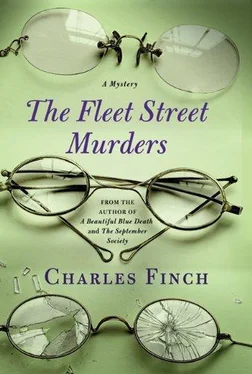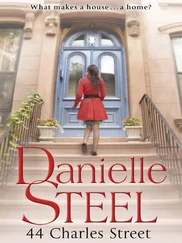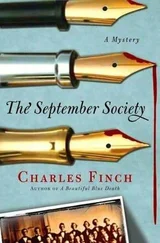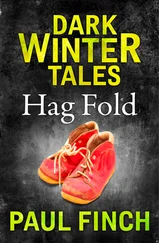Charles Finch - Fleet Street murders
Здесь есть возможность читать онлайн «Charles Finch - Fleet Street murders» весь текст электронной книги совершенно бесплатно (целиком полную версию без сокращений). В некоторых случаях можно слушать аудио, скачать через торрент в формате fb2 и присутствует краткое содержание. Жанр: Исторический детектив, на английском языке. Описание произведения, (предисловие) а так же отзывы посетителей доступны на портале библиотеки ЛибКат.
- Название:Fleet Street murders
- Автор:
- Жанр:
- Год:неизвестен
- ISBN:нет данных
- Рейтинг книги:5 / 5. Голосов: 1
-
Избранное:Добавить в избранное
- Отзывы:
-
Ваша оценка:
- 100
- 1
- 2
- 3
- 4
- 5
Fleet Street murders: краткое содержание, описание и аннотация
Предлагаем к чтению аннотацию, описание, краткое содержание или предисловие (зависит от того, что написал сам автор книги «Fleet Street murders»). Если вы не нашли необходимую информацию о книге — напишите в комментариях, мы постараемся отыскать её.
Fleet Street murders — читать онлайн бесплатно полную книгу (весь текст) целиком
Ниже представлен текст книги, разбитый по страницам. Система сохранения места последней прочитанной страницы, позволяет с удобством читать онлайн бесплатно книгу «Fleet Street murders», без необходимости каждый раз заново искать на чём Вы остановились. Поставьте закладку, и сможете в любой момент перейти на страницу, на которой закончили чтение.
Интервал:
Закладка:
“Are you terribly disappointed?” she asked. Now she led him down the hall and into her rose-colored drawing room, from whence that solitary lamp had been visible from the street.
“It was more of a sharp, quick pain,” he said, “than a long, dull one. I thought it would have been the other way around.”
“How unfair, though! Will you tell me about it?”
In such a way that he had barely noticed, she had maneuvered him into his favorite chair and then sat beside him. In a torrent, then, he told the entire thing to her-about Mayor Adlington and his long watch chain, about Roodle’s squeal during the debate, about their impromptu exchange in Sawyer Park, about Sandy and Mrs. Reeve and Nettie and Crook and Lucy the waitress, about the awful dinner parties, the endless days out in the countryside, the hustings in front of the Queen’s Arms and the speeches. The two old friends laughed at the funny bits and felt solemn together at the serious bits, and when he was through telling the story it felt as if he were finally through the experience. He had had his chance and lost. So it goes, he thought. Perhaps there will be another, but even if there isn’t-if there isn’t that’s all right as well.
And here, he asked? What was the news?
“Thomas and Toto are doing the best they can,” said Lady Jane.
“I’m glad to hear it, of course, but you know what I mean-London, the chatter, I’ve missed it all.”
“It’s my turn to entertain you?” she said. “Well, the Duchess is having her house redecorated, and the whole family is moving to the country for six months while it’s done… let me think… Deborah Trice is going to marry Fordyce Pratt.”
“I haven’t the faintest idea who either of them is.”
“He’s a judge.”
“That ancient lump of flesh I see at the Devonshire? Surely he doesn’t have it in him.”
She laughed. “Yes, in fact,” she said, “and you ought to know that Deborah is a very respectable widow, just returned from some part of India where her husband was posted.”
“A tiger ate him, I assume?”
“Fever,” she said, though still laughing. “What else? George Barnard was to have a party, but he’s gone to Geneva instead, some sort of conference, and people are terribly disappointed. You know he has that ballroom.”
“Humph,” said Lenox, or some grumpy noise approximating that.
“Yes, yes, I know you don’t like him. Oh! Frederick Fleer was in a duel, you know, but neither man was hurt.”
Slowly, then, Lenox and Lady Jane resumed their lifelong conversation. An hour later, thoroughly exhausted, she led him to the door.
He gave her a chaste kiss on her red lips. “Thank you for staying up,” he said.
A serious note returned to her voice after much laughter, and she said, “Oh, but of course.”
They agreed to see each other the next day, and as he walked back up the steps to his house Lenox thought happily of all the long hours he would sleep on his own soft bed. Tomorrow there was work to be done, but tonight he could truly rest. Maybe for a while in the morning, too.
The house was quiet. He hung up his coat and began to make his way upstairs, only to check himself and return to the door of the library, through which he peered to find Edmund sleeping still, and before Lenox traipsed up to his bedroom he stood and felt a deep swell of affection, of true kinship, for his brother.
CHAPTER THIRTY-FIVE
His first action the next morning, following his bath and his breakfast, was to go and see Thomas and Toto.
They were sitting in a drawing room when the butler led him in, Toto knitting something pink and McConnell reading the newspaper with a cup of tea close at hand, the strong green tea he preferred. They looked up at him, and both smiled. McConnell’s great florid face looked battered, even wounded, but instantly Lenox saw that a resolute companionship had sprung up between him and his wife. It was easy to admire-and made it easy to forget the doctor coming up to Stirrington when he was barmy drunk and half mad with sorrow.
“I hear you lost, Charles,” said Toto. “I’m so sorry.”
Lenox waved a hand. “It’s no great matter. I’m only happy to be back in London.”
“Have you seen Jane yet?”
“I saw her last night. Some man was in a duel, apparently-”
“Freddie Fleer,” said Toto, nodding.
“No doubt that’s him. Two other people are going to be married. All that sort of thing.”
“Was it close, the by-election?” asked McConnell.
“Quite close, yes. I think it came down to the other man’s local support. It’s hard to win over a town full of northerners in two weeks.”
“I can’t say I’ve ever tried,” said Toto with a laugh.
Lenox laughed, too. “You’ll have to take my word for it, anyway. Still, it was a close-run thing, and I’m happy I did it.” He wondered if he should ask after her health but decided against it. “What about our little project?” he said instead, referring to his honeymoon with Jane. “Have you been studying?”
“I have!” she said with some animation. “When can we speak about it?”
“Very soon,” he promised. “I have to look into these crimes at the moment, but then you’ll have my full attention.”
“What in blazes are you two so mysterious about?” asked McConnell indignantly, having watched their exchange.
“Oh, nothing,” said Toto, acting perhaps a bit more cryptic than was necessary.
Lenox laughed. “Toto’s helping me with something,” he said. “I’m sure she’ll tell you all about it after I leave. Look, though, Thomas, I thought I might put you in the way of a bit of work. Not medical, however.”
“Oh?”
“I was hoping you’d come to Carruthers’s apartment and act as a second pair of eyes for me.”
“To be sure. When?”
“This afternoon, I hope, though I have Exeter’s funeral to attend. We’ll see when they let me in. I’ll pick you up, at any rate?”
“As you like.”
“See you then.”
Lenox left soon thereafter and, after stopping at home to make sure that Dallington wasn’t waiting for him, directed his driver to Fleet Street.
Printers and pamphlet makers had inhabited Fleet Street since 1500, but it was only in the spring of 1702 that it had gained its modern character-that was when the first daily newspaper in the world, the Daily Courant, opened its office and began publishing from the street.
In the subsequent century and a half it had become a collegial place, its pubs full of dueling journalists who put aside their differences at the bar to drink, to laugh, and to trade barbs, often with the equally drunken and witty solicitors who inhabited the close-by Inns of Court. It all savored even now of Dickens and Dr. Johnson and the grand tradition of literature-of a certain kind of literature. As Matthew Arnold said, “Journalism is literature in a hurry.”
Lenox planned to visit the office of the Daily Telegraph, where Carruthers had worked, and then if he could the man’s apartment. If Pierce had been the distraction from the real crime, as he suspected, then this was where he would have to begin his investigation over again.
The Telegraph ’s building was a busy place, with young men running in and out of the door and the tremendous whine, drum-beat, and squeal of the printing press audible from the street. On the fourth floor, however, where he knew from the newspapers that Carruthers had worked, it was quieter.
Lenox greeted a young woman, a typist, who was hurrying toward a closed door across the floor’s large foyer. “Excuse me,” he said, “but who’s in charge here?”
“Mr. Moon, of course,” she said.
“And where is-”
Читать дальшеИнтервал:
Закладка:
Похожие книги на «Fleet Street murders»
Представляем Вашему вниманию похожие книги на «Fleet Street murders» списком для выбора. Мы отобрали схожую по названию и смыслу литературу в надежде предоставить читателям больше вариантов отыскать новые, интересные, ещё непрочитанные произведения.
Обсуждение, отзывы о книге «Fleet Street murders» и просто собственные мнения читателей. Оставьте ваши комментарии, напишите, что Вы думаете о произведении, его смысле или главных героях. Укажите что конкретно понравилось, а что нет, и почему Вы так считаете.












